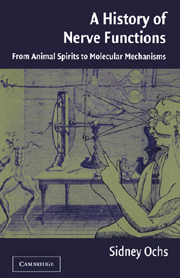Book contents
- Frontmatter
- Contents
- Preface
- 1 Introduction: Greek Science and the Recognition of Nerve as a Channel
- 2 Galen's Physiology of the Nervous System
- 3 Nerve, Brain, and Soul in the Middle Ages
- 4 Renaissance and the New Physiology
- 5 New Physical and Chemical Models of Nerve in the Enlightenment
- 6 New Systematizations of Nerve Function in the Enlightenment
- 7 Electricity as the Agent of Nerve Action
- 8 Nerve Fiber Form and Transformation
- 9 Wallerian Degeneration: Early and Late Phases
- 10 Nerve Regeneration
- 11 Characterization of Axoplasmic Transport
- 12 Molecular Models of Transport
- 13 Actions of Neurotoxins and Neuropathic Changes Related to Transport
- 14 Purposeful Reflexes and Instinctive Behavior
- 15 Neural Events Related to Learning and Memory
- 16 Epilogue: With Observations on the Relation of the Nervous System to Mind
- Bibliography
- Index
15 - Neural Events Related to Learning and Memory
Published online by Cambridge University Press: 13 August 2009
- Frontmatter
- Contents
- Preface
- 1 Introduction: Greek Science and the Recognition of Nerve as a Channel
- 2 Galen's Physiology of the Nervous System
- 3 Nerve, Brain, and Soul in the Middle Ages
- 4 Renaissance and the New Physiology
- 5 New Physical and Chemical Models of Nerve in the Enlightenment
- 6 New Systematizations of Nerve Function in the Enlightenment
- 7 Electricity as the Agent of Nerve Action
- 8 Nerve Fiber Form and Transformation
- 9 Wallerian Degeneration: Early and Late Phases
- 10 Nerve Regeneration
- 11 Characterization of Axoplasmic Transport
- 12 Molecular Models of Transport
- 13 Actions of Neurotoxins and Neuropathic Changes Related to Transport
- 14 Purposeful Reflexes and Instinctive Behavior
- 15 Neural Events Related to Learning and Memory
- 16 Epilogue: With Observations on the Relation of the Nervous System to Mind
- Bibliography
- Index
Summary
The machine-like reflex responses of spinal animals and the instinctive behavior seen in lower species contrast with the adaptability of the behavior controlled by the brain in the higher species, especially in man where higher cognitive functions and willed behavior predominate (Chapter 14). In some of the earliest speculations, the brain was held to be the site where a higher spiritual entity, the soul, was responsible for cognition and willed activities. As more was known of the complexities of the brain, the Alexandrians Herophilus and Erasistratus, and above all Galen, assigned the higher functions of imagination, reasoning, and memory to the passage of animal spirits in the ventricles. This localization of functions was enshrined in the “cell theory” which held sway throughout the Middle Ages (Chapter 2). As the anatomy of the brain became better known, higher functions were assigned to various brain structures. The cerebrum, with its complex gyrations and the greater expanse of the cortex over the surface of the cerebrum in man, became identified with the higher functions of reasoning, learning, and memory. When the neuron and its interactions were recognized as the basis of nervous integration, changes in neuronal structure, particularly of the dendrites where synaptic interactions on them were seen to occur, was held to account for learning and memory.
- Type
- Chapter
- Information
- A History of Nerve FunctionsFrom Animal Spirits to Molecular Mechanisms, pp. 317 - 352Publisher: Cambridge University PressPrint publication year: 2004



